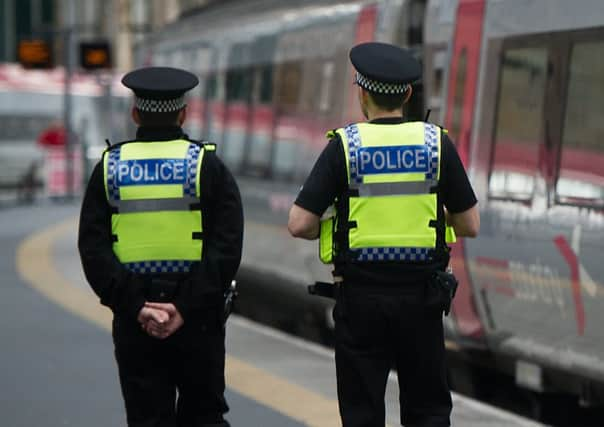Tom Peterkin: Mason's knack for squabbles obscures real debate


The SNP’s John Mason has yet again demonstrated that he has a gift – if that’s the right word – for rubbing people up the wrong way.
As reported in these pages yesterday, the SNP MSP for Glasgow Shettleston has clashed with the British Transport Police Federation (BTPF) over one of the Scottish Government’s key policies.
Advertisement
Hide AdAdvertisement
Hide AdMr Mason irritated the BTPF chairman Nigel Goodband by suggesting the federation was more interested in empire building than public safety when it came to its opposition to the government’s plans to merge the British Transport Police (BTP) with Police Scotland.
The spat had its origins in a letter written by Mr Goodband and sent to all MSPs in which the BTPF chairman argued that the merger plans would have a negative impact on public safety.
Mr Mason responded by writing an email which displayed his flair for putting his size 12s in it – a talent which makes for entertaining newspaper copy but must be becoming a little tiring as far as his SNP bosses are concerned.
Questioning the BTPF’s motive for opposing the merger, Mr Mason wrote to Mr Goodband saying: “You claim public safety is your main concern. I am not convinced. I think there is a desire on the part of a BTP and the BTPF to have its own little empire.”
Unsurprisingly, Mr Mason’s observation drew a rather frosty response from Mr Goodband. As the chairman of the organisation representing 2,500 officers policing the UK’s railways, Mr Goodband was unhappy at the suggestion that safety was not at the heart of everything his organisation does.
“To question our motives is simply distasteful,” the BTPF chairman wrote to Mr Mason. “Earlier this month as highlight in my correspondence to Ministers, it was our brave colleagues in BTP who were first responders to the destructive attacks in Manchester, many saving lives. It was a BTP officer who bravely took on three terrorists in horrific attacks at London Bridge.”
That Mr Mason should find himself at the centre of controversy has become par for the course for the stormy petrel of SNP politics.
This, after all, is a man who forced an apology out of Nicola Sturgeon after he suggested the IRA could be considered freedom fighters when the deaths of three Scottish soldiers at the hands of the terrorists were being discussed on Twitter.
Advertisement
Hide AdAdvertisement
Hide AdThis latest spat involving Mr Mason should not overshadow the substantive issue – the merits or otherwise of the Scottish Government’s plans to merge BTP Scotland with Police Scotland.
As a doughty – if clumsy – defender of the government’s position, Mr Mason believes a merger is “common sense” with the public expecting a “joined up” police force.
Others, however, may see the irony in an SNP politician accusing the BTP and BTPF of empire building in light of this merger proposal.
There has also been the Scottish Government’s centralising police reforms that led to the creation of Police Scotland. That particular piece of empire building has been far from an unalloyed success, with the single force coming under fire for a host of controversies.
These have included the deployment of armed officers, concerns about a lack of public accountability, and the control room blunders that led to a car containing a dead couple lying undetected by the M9.
With the Scottish Government pressing ahead with its merger plans via the Railway Policing (Scotland) Bill, there is all the more reason to listen to the notes of caution being sounded by the BTPF.
In his letter to MSPs, Mr Goodband made clear his opposition to the proposal and set out his reservations. He warned of an “exodus” of officers from BTP Scotland because of what they saw as the risks to their jobs, pay and pensions.
“As predicted, officers are already seeking transfers, or are leaving policing – taking considerable years of knowledge and experience with them – because of continued uncertainty around what the future holds for them,” Mr Goodband wrote.
Advertisement
Hide AdAdvertisement
Hide AdFurthermore, Mr Goodband anticipates “teething problems” which will affect policing of the railways. “The railway network can ill-afford to have a lower standard of security and protection at a time when the threat from terrorism remains severe,” he told MSPs.
BTP officers on the ground are concerned that Police Scotland officers may lack the expertise to deal with the unique challenges posed by policing the rail network.
There are also concerns, expressed by Mr Goodband, that Police Scotland officers are unable to enter certain “critical” areas of the railway infrastructure because of a lack of training.
Mr Goodband summed up, saying: “It remains the view of British Transport Federation that this bill should be suspended until there is certainty on what the future looks like and the cost to deliver the integration and subsequent training is known in full. It is our opinion that the security of passengers and rail staff is being risked in pursuit of rushed and ill-considered legislation.”
Clearly there are those who are in the “if it ain’t broke, don’t fix it” school of thought.
Mr Mason is not one of them. He believes there is good reason to question the motives of those opposing the Railway Policing (Scotland) Bill. The flip-side is that there appear very sound reasons for questioning the motives of the Scottish Government.